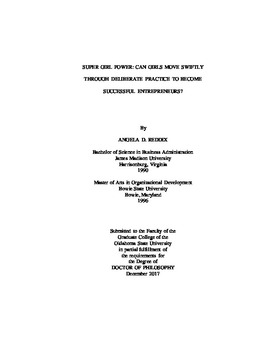| dc.contributor.advisor | Rutherford, Matthew | |
| dc.contributor.author | Reddix, Angela D. | |
| dc.date.accessioned | 2018-06-25T13:38:29Z | |
| dc.date.available | 2018-06-25T13:38:29Z | |
| dc.date.issued | 2017-12 | |
| dc.identifier.uri | https://hdl.handle.net/11244/300263 | |
| dc.description.abstract | The researcher developed a five-day, seven-city entrepreneurship program--Envision Lead Grow--which introduces middle-school girls to entrepreneurship through small groups managed by camp counselors. This program culminates with a business pitch competition in which girls win a monetary prize based on scores from judges. This study adopts Baron and Henry's (2010) deliberate practice model to explain how establishing opportunities for girls to engage in entrepreneurial deliberate practice activities will enhance the performance of tasks that influence new venture performance. Baron and Henry's model provides creative solutions for identifying activities that constitute an entrepreneur's deliberate practice (i.e., experiential learning, vicarious learning, and past experience in other domains). This study examines the mediating role of deliberate practice between antecedents (i.e., self-efficacy, self-control, conscientiousness, and delayed gratification) and desirable outcomes (the resultant cognitive resources and enhanced entrepreneurial task performance). To accomplish this, 414 middle-school girls participating in the Envision Lead Grow entrepreneurship program were assessed on antecedents of deliberate practice at the beginning of the program (T1) and again on the last day of the session (T2). Also, program counselors responded to a daily questionnaire to assess each girl's level of engagement in deliberate practice. Finally, entrepreneur judges completed an instrument based on a pitch competition to capture the enhanced performance of tasks that influence new venture performance. Findings of this study were somewhat surprising, as they were not consistent with the theoretical model regarding the relationship between the antecedents (self-efficacy, self-control, conscientiousness and delayed gratification) and deliberate practice. Moreover, the mediated relationship between entrepreneurial task performance and the cognitive resource of intuition was not present. However, the key relationship--the impact of deliberate practice on performance--was supported. | |
| dc.format | application/pdf | |
| dc.language | en_US | |
| dc.rights | Copyright is held by the author who has granted the Oklahoma State University Library the non-exclusive right to share this material in its institutional repository. Contact Digital Library Services at lib-dls@okstate.edu or 405-744-9161 for the permission policy on the use, reproduction or distribution of this material. | |
| dc.title | Super girl power: Can girls move swiftly through deliberate practice to become successful entrepreneurs? | |
| dc.contributor.committeeMember | Watters, Craig | |
| dc.contributor.committeeMember | Sarathy, Rathin | |
| dc.contributor.committeeMember | Pollack, Jeffery | |
| osu.filename | Reddix_okstate_0664D_15534.pdf | |
| osu.accesstype | Open Access | |
| dc.type.genre | Dissertation | |
| dc.type.material | Text | |
| dc.subject.keywords | deliberate practice | |
| dc.subject.keywords | cognitive resources | |
| dc.subject.keywords | intuition | |
| dc.subject.keywords | self-efficacy | |
| dc.subject.keywords | self-control | |
| dc.subject.keywords | conscientiousness | |
| dc.subject.keywords | delayed gratification | |
| dc.subject.keywords | middle school | |
| dc.subject.keywords | girls | |
| dc.subject.keywords | entrepreneur | |
| thesis.degree.discipline | Business Administration | |
| thesis.degree.grantor | Oklahoma State University | |
